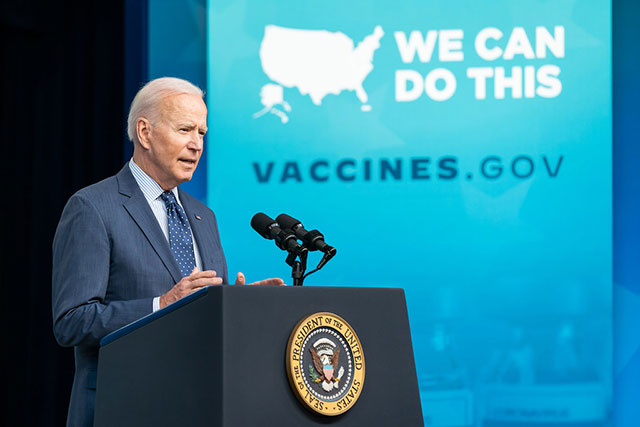Want to Vaccinate More Americans? Get Top Republicans to Endorse Vaccines
Messages from Democrats risk “backlash effects” that could deter Republicans from getting vaccinated
Get all our news
This is a discouraging finding because it suggests that continually hearing Democratic endorsements could dissuade vaccinated Republicans from encouraging other Republicans to do so.”
James Druckman
IPR political scientist

As the highly transmissible Delta variant pushes up cases of COVID-19 cases and deaths in the U.S. to alarming levels, President Joe Biden and other top administration officials have taken to the airwaves, urgently pressing more Americans to get vaccinated. But a new study shows that messages from top Democrats could actually deter Republicans, the most vaccine-hesitant group, from getting the life-saving vaccines.
Published in the Proceedings of the National Academy of Sciences, the researchers from Stanford, Columbia, Northwestern, and MIT surveyed nearly 1,500 Republicans between March 17 and 24 about their willingness to get vaccinated and their likelihood to encourage others to do so.
“We thought this was a crucial question to address given the bulk of vaccine messages have been coming from Democrats, with Republicans — until last week — remaining largely quiet or, in some cases, discouraging vaccination,” IPR political scientist James Druckman, one of the study co-authors.
Overall, the number of Americans willing to vaccinate continues to rise—from 45% in November 2020 to 72% by May 2021. But vaccine take-up remains uneven and politically polarized. Nearly half of all Republicans (49%) reported they did not plan on or were unsure about getting a COVID vaccination as of late May 2021.
The researchers divided the Republican participants into three groups. One watched a speech by former President Donald Trump where he endorsed getting a vaccine and also read endorsements by top Republicans. Another watched President Biden endorsing vaccines and then read endorsements by top Democrats. The third was a control group that received a neutral, nonpolitical message. More than three-fourths of respondents (77%) were not vaccinated.
Those in the group getting Republican messages were 7% more likely to say they would get vaccinated than those who got Democratic messages, and nearly 6% more likely to do so than those in the control group.
On the other hand, the Republicans shown Democratic endorsements were 10% less likely to encourage others to vaccinate than those getting the Republican ones, and 12% less likely when compared to the control group. This group also held more negative attitudes about how vaccinations could help the economy or that the vaccine’s benefits outweighed the risks.
Such “backlash effects” drive down the chances that Republicans who heard the messages from top Democrats would be more inclined to get vaccinated or encourage others to do so.
“This is a discouraging finding because it suggests that continually hearing Democratic endorsements could dissuade vaccinated Republicans from encouraging other Republicans to do so,” Druckman said.
In analyzing the responses, the researchers pinpoint that respondents’ beliefs that they were doing what the Republican leaders wanted as one of the reasons shaping why some responded positively to such endorsements.
“Respondents said they followed the Republican cues because they would do what they were told. This reveals the potential power of Republican endorsements,” Druckman said. “It also gives hope of more vaccinations given the increasing number of Republicans, such as Mitch McConnell, who have recently endorsed vaccination.”
While the researchers lay out more work to do in understanding the full effects of the messaging by top political leaders, they also show how the current results can be applied to designing more effective interventions in other countries where vaccines are politically polarized.
James Druckman is the Payson S. Wild Professor of Political Science and IPR associate director and fellow.
Photo Credit: Flickr; A. Schultz
Published: July 28, 2021.


